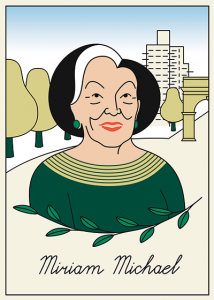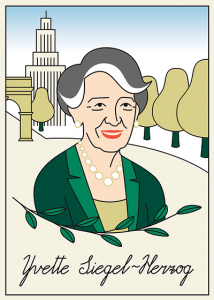International Women’s Day is celebrated annually on March 8, and is a perfect day to celebrate our founders. In 1962, Stephen Gaynor School grew out of a friendship between two visionaries – Dr. Miriam Michael, a psychologist, and Yvette Siegel-Herzog, an educator – who met as students at New York University. Though the field of special education was in its infancy at the time, the friends saw the need to establish a school for bright students with learning challenges. Incorrectly labeled as “slow learners,” these students were often caught in a cycle of academic failure and low self-esteem.
Thus, the pair created a school where the students could thrive, pioneering the individualized, multi-sensory teaching approach used today. In 1962, they enrolled their first class with five students, housed in a two-room Upper East Side apartment. Sixty years later, the school enrolls nearly 375 students from Early Childhood through Middle School in two buildings totalling 80,000 square feet.
We’re proud to say that after sixty years, Michael’s and Siegel-Herzog’s vision has grown from an idea about a school that could help children with learning differences to one that has touched thousands of children.
Dr. Miriam Michael, known affectionately as Mimi, left an indelible influence on Stephen Gaynor School and on special education in general. She passed away in 2017 at the age of 100.
Yvette Siegel-Herzog has said, “Without Mimi by my side, our legacy to the future of children whose educational needs cried out for acknowledgement and understanding would not exist. When we realized that legions of bright and creative students were misunderstood educationally, emotionally, and socially, Mimi and I literally exploded onto the educational enclave, clamoring and insisting that our boys and girls had been neglected for far too long. Together, we developed our mission and dedicated our life’s work towards the creation of a community where the needs of children and their families were recognized, dignified, and above all, acknowledged and remediated. Mimi’s shouting was louder than anyone’s.”
At a celebration of Dr. Michael’s life in 2018, Head of School Dr. Scott Gaynor said, “My grandmother’s legacy of fostering the joy of learning continues to impact the lives of children at Gaynor. Thank you Mimi, we will always remember what you have done for Stephen Gaynor School.”
From the early days of the school’s founding, Yvette Siegel-Herzog quickly became a gatekeeper of sorts with regard to finding “Gaynor kids.” She met for hours with each prospective student and family, to determine whether or not Stephen Gaynor School would be the right fit for each student’s educational and emotional journey. Although the school has changed dramatically since its founding in an East Side apartment, parents of students from the 1960s through today will recognize the individual attention paid to each child, from that intake interview through their entire tenure at Stephen Gaynor School.
Yvette continues her daily commitment to ensure the school continues to provide the “highly individualized educational program” embedded in the school’s motto.
When asked what keeps her coming back to work each day, Yvette replied, “My love for the school. In part it’s all the children I have right here under my nose. It is the stimulation of my colleagues. I would hate to feel “excessed” – I would hate to feel I am not doing something useful. One is tempted, but relaxation is only lovely for a short spell in the context of being useful.”
Yvette’s vision for the future is, “to continue the success on which the school has been built thus far. To always make sure that every child is a) getting what we say he’s getting, and b) getting what he needs. To continue to have the best teachers, taking care of the vulnerable, delicate, resilient, wonderful children that have been entrusted to us. And above all that there is honesty in the relationships between and among the staff, the children, and everyone associated with our program.”
Because the institution has grown, with hundreds more students, faculty, staff, and administrators than the founders could have ever predicted, Yvette is no longer able to have a straight-line relationship with each and every Gaynor student. But, Yvette has said, “the better the intermediaries are, and the more they are on that wavelength of paving the way, the more the child will be able to accomplish what I envision. We are a good institution. Solid — the foundation is rock. And yet, porous enough so that we can be open to innovation in teaching, in thinking.”


